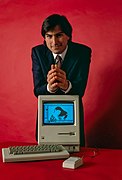Portal:Internet
The Internet PortalThe Internet (or internet) is the global system of interconnected computer networks that uses the Internet protocol suite (TCP/IP) to communicate between networks and devices. It is a network of networks that consists of private, public, academic, business, and government networks of local to global scope, linked by a broad array of electronic, wireless, and optical networking technologies. The Internet carries a vast range of information resources and services, such as the interlinked hypertext documents and applications of the World Wide Web (WWW), electronic mail, telephony, and file sharing. The origins of the Internet date back to research that enabled the time-sharing of computer resources and the development of packet switching in the 1960s. The set of rules (communication protocols) to enable internetworking on the Internet arose from research and development commissioned in the 1970s by the Defense Advanced Research Projects Agency (DARPA) of the United States Department of Defense in collaboration with universities and researchers across the United States and in the United Kingdom and France. The ARPANET initially served as a backbone for the interconnection of regional academic and military networks in the United States to enable resource sharing. The funding of the National Science Foundation Network as a new backbone in the 1980s, as well as private funding for other commercial extensions, encouraged worldwide participation in the development of new networking technologies and the merger of many networks using DARPA's Internet protocol suite. The linking of commercial networks and enterprises by the early 1990s, as well as the advent of the World Wide Web, marked the beginning of the transition to the modern Internet, and generated sustained exponential growth as generations of institutional, personal, and mobile computers were connected to the network. Although the Internet was widely used by academia in the 1980s, the subsequent commercialization in the 1990s and beyond incorporated its services and technologies into virtually every aspect of modern life. (Full article...) Selected article Bomis (/ˈbɒmɪs/, from Bitter Old Men in Suits; rhyming with "promise"), was a dot-com company best known for supporting the creations of free-content online-encyclopedia projects Nupedia and Wikipedia. It was co-founded in 1996 by Jimmy Wales, Tim Shell, and Michael Davis. By 2007, the company was inactive, with its Wikipedia-related resources transferred to the Wikimedia Foundation. The company initially tried a number of ideas for content, including being a directory of information about Chicago. The site subsequently focused on content geared to a male audience, including information on sporting activities, automobiles, and women. Bomis became successful after focusing on pornography. "Bomis Babes" was devoted to erotic images; the "Bomis Babe Report" featured adult pictures. Bomis Premium, available for an additional fee, provided explicit material. "The Babe Engine" helped users find erotic content through a web search engine. The advertising director for Bomis noted that 99 percent of queries on the site were for nude women. (Full article...) Selected picture A hotspot is a venue that offers Wi-Fi access. The public can use a laptop, WiFi phone, or other suitable portable device to access the Internet. Of the estimated 150 million laptops, 14 million PDAs, and other emerging Wi-Fi devices sold per year for the last few years, most include the Wi-Fi feature. News
Wikinews Internet portal
WikiProjects
Did you know (auto-generated) -
Selected biography
Albert Arnold "Al" Gore, Jr. (born March 31, 1948) was the forty-fifth Vice President of the United States, serving from 1993 to 2001 under President Bill Clinton. Gore previously served in the U. S. House of Representatives (1977–85) and the U. S. Senate (1985–93), representing Tennessee. He was the Democratic Party presidential nominee in the 2000 election, and shared the 2007 Nobel Peace Prize with the Intergovernmental Panel on Climate Change for his work as an environmental activist. Gore has been involved with the development of the Internet since the 1970s, first as a Congressman and later as Senator and Vice-President. His High Performance Computing and Communication Act of 1991 (often referred to as the Gore Bill) was passed on December 9, 1991 and led to the National Information Infrastructure (NII) which Gore referred to as the "information superhighway." Leonard Kleinrock, a key player in the development of the ARPANET, considers the act to be a critical moment in Internet history. Internet pioneers Vint Cerf and Bob Kahn stated in the 2000 article "Al Gore and the Internet", that Gore was "the first political leader to recognize the importance of the Internet and to promote and support its development."
General images -The following are images from various internet-related articles on Wikipedia.
Selected quoteMore Did you know...
Main topics
Featured contentCategoriesRelated portalsThings you can do
Associated WikimediaThe following Wikimedia Foundation sister projects provide more on this subject:
Wikipedia's portals |
- Portals with triaged subpages from February 2020
- All portals with triaged subpages
- All portals
- Portals with no named maintainer
- Random portal component with 31–40 available subpages
- Random portal component with 16–20 available image subpages
- Random portal component with 16–20 available subpages
- Random portal component with 21–25 available subpages
- Random portal component with 6–10 available subpages
- Internet
- Internet portal
- Computing portals




















































